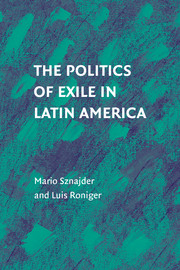Book contents
- Frontmatter
- Contents
- Acknowledgments
- List of Acronyms
- Introduction: The Politics of Exile
- 1 Defining the Exilic Condition
- 2 Forceful Displacement, the Construction of Collective Identities, and State Formation
- 3 The Format of Early Exile
- 4 Sites of Exile
- 5 Widening Exclusion and the Four-Tiered Structure of Exile
- 6 Exile Communities, Activism, and Politics
- 7 Presidents in Exile
- 8 Is Return the End of Exile?
- Bibliography
- Index
- References
4 - Sites of Exile
Published online by Cambridge University Press: 28 July 2009
- Frontmatter
- Contents
- Acknowledgments
- List of Acronyms
- Introduction: The Politics of Exile
- 1 Defining the Exilic Condition
- 2 Forceful Displacement, the Construction of Collective Identities, and State Formation
- 3 The Format of Early Exile
- 4 Sites of Exile
- 5 Widening Exclusion and the Four-Tiered Structure of Exile
- 6 Exile Communities, Activism, and Politics
- 7 Presidents in Exile
- 8 Is Return the End of Exile?
- Bibliography
- Index
- References
Summary
Gentle homeland, receive the vows,
Which Chile swore on your altars:
That you either be the tomb of the free
Or the asylum from oppression
From Chile's national anthemAlthough for centuries Latin America received waves of conquerors, colonizers, slaves, and immigrants, it has been also characterized by varied forms of translocation and expatriation, ostracism and relegation, displacement and exile. Persecuted for political reasons, or fearing for their integrity and safety, individuals have been displaced within their countries or forced to move beyond their borders. This chapter analyzes some of the major sites or lieux d'exil chosen by the exiles under constrained circumstances.
Selecting Factors
Studies of internal and international migration have identified a series of strategies and chain factors, shaping the waves of transnational migration. The dynamic highlighted by these studies also operates in exile, shaping the constrained choices of the persecuted. There is, however, a major difference between voluntary migration and forced relocation. The harsher the persecution, the fewer the options prospective exiles have in selecting a site of asylum. Of particular weight is the immediate or protracted need to escape for one's life. Lack of time and urgency often override other considerations.
There is another significant difference between an undocumented person who, escaping armed persecution, jumps the fence of an embassy to save his or her life and an individual who, sensing persecution, has the time and resources to evaluate alternative routes of escape and asylum and whether and when to leave the home country.
- Type
- Chapter
- Information
- The Politics of Exile in Latin America , pp. 91 - 135Publisher: Cambridge University PressPrint publication year: 2009



